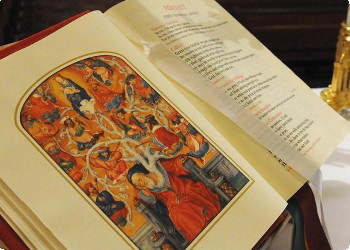Herodias harboured a grudge against him and wanted to kill him
29 AUGUST (Mk 6,17-29)
The Martyrdom of John the Baptist is the fruit of a multitude of sins, so chained as to become one the result of the other, and all together produce the death of the Precursor of the Lord. But where there is death, there is always the sin of the multitude, there. Alone no sin would have such a power of destruction. This rule also applies to the great upheavals of history, the massacres, the great genocides and devastations. To the sin of one the sin of an other is always added.
This truth is often forgotten and the responsibility of the death is attributed only to one. It is ignored the fact that every death is often the result of a multitude of sins that precede and almost invoke it. Who wants death not to exist must want its cause, which is sin, not to exist. Death is removed if sin is taken away. If sin is left to live with all its power of destruction and spiritual devastation, even death will reign, becoming stronger and more powerful in its harmful effects. But today sin is given the right to citizenship. As a result the right to citizenship is given to death, the right to take down every life, without sparing any. Unfortunately, no one wants to accept this truth and laws to prevent death are made, while nothing is done to remove sin from our world.
The death of John the Baptist does not start from Galilee. It has its origins in the capital of the Empire. Herodias was living in Rome. She was the wife of Philip, Herod’s brother. Herod was in Rome. Herodias left her lawful husband and went to live with his brother. From a wife she became a concubine and an adulteress. John reminds Herod his sin. It is not lawful to take his brother’s wife. It is his brother’s. It is not his. Even kings are subject to the laws of the Lord. They are not exempt from complying with the holy provisions of life. Rather, they are often the ones called upon to give a good example to their subjects.
This admonition of John for Herod to send Herodias back, causes in the heart of the woman an infinite hatred, a desire of death and of elimination of the prophet of God. Today, is it not taught and said, perhaps, that every woman has the destiny of her life in her hands? Is it not proclaimed everywhere that it is up to them every decision even on the unborn child that is in their womb? Is it not shouted that no law must prevent, hinder, regulate their autonomy to do what they want and to live as it seems best to them? Is it not a freedom invoked before the most elementary rules of prudence and wisdom, in order to prevent that evil kills them?
Herod was the one who had John arrested and bound in prison on account of Herodias, the wife of his brother Philip, whom he had married. John had said to Herod, “It is not lawful for you to have your brother’s wife.” Herodias harboured a grudge against him and wanted to kill him but was unable to do so. Herod feared John, knowing him to be a righteous and holy man, and kept him in custody. When he heard him speak he was very much perplexed, yet he liked to listen to him. She had an opportunity one day when Herod, on his birthday, gave a banquet for his courtiers, his military officers, and the leading men of Galilee. Herodias’s own daughter came in and performed a dance that delighted Herod and his guests. The king said to the girl, “Ask of me whatever you wish and I will grant it to you.” He even swore (many things) to her, “I will grant you whatever you ask of me, even to half of my kingdom.” She went out and said to her mother, “What shall I ask for?” She replied, “The head of John the Baptist.” The girl hurried back to the king’s presence and made her request, “I want you to give me at once on a platter the head of John the Baptist.” The king was deeply distressed, but because of his oaths and the guests he did not wish to break his word to her. So he promptly dispatched an executioner with orders to bring back his head. He went off and beheaded him in the prison. He brought in the head on a platter and gave it to the girl. The girl in turn gave it to her mother. When his disciples heard about it, they came and took his body and laid it in a tomb.
To the sin of Herod and Herodias also that of her daughter is being added. The king is captivated by her shamelessness and for John the time of his end comes.
Virgin Mary, Mother of the Redemption, Angels and Saints free us from all sin.





